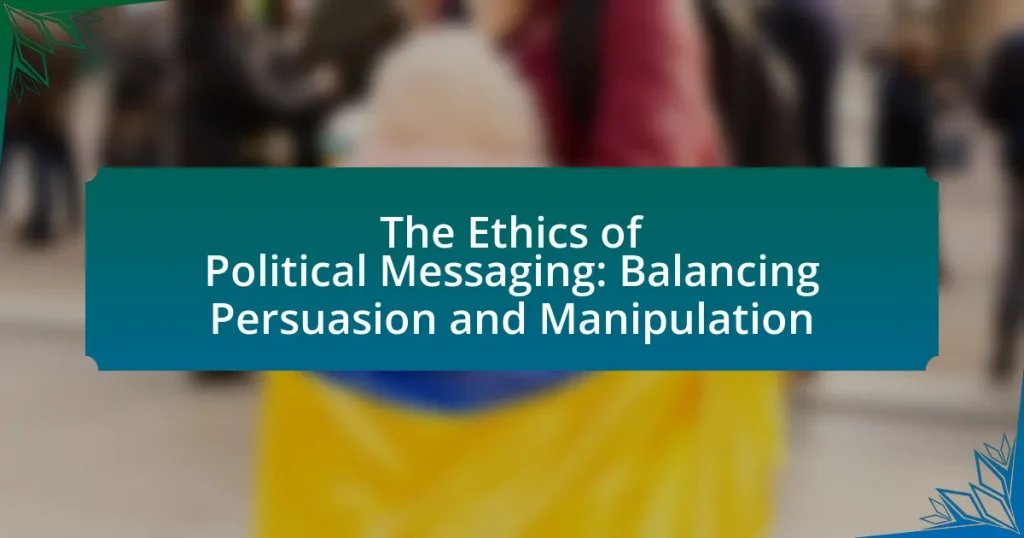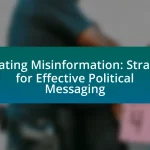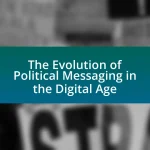The article examines the ethics of political messaging, focusing on the critical balance between persuasion and manipulation. Key concepts discussed include truthfulness, transparency, manipulation, and the responsibility of communicators, emphasizing their importance in maintaining ethical standards in political communication. The article also explores the distinctions between persuasion and manipulation, the ethical implications of persuasive tactics, and the potential consequences of unethical messaging on public trust and democratic processes. Additionally, it highlights strategies for ethical political messaging, the role of fact-checking, and the impact of cultural context on communication practices.
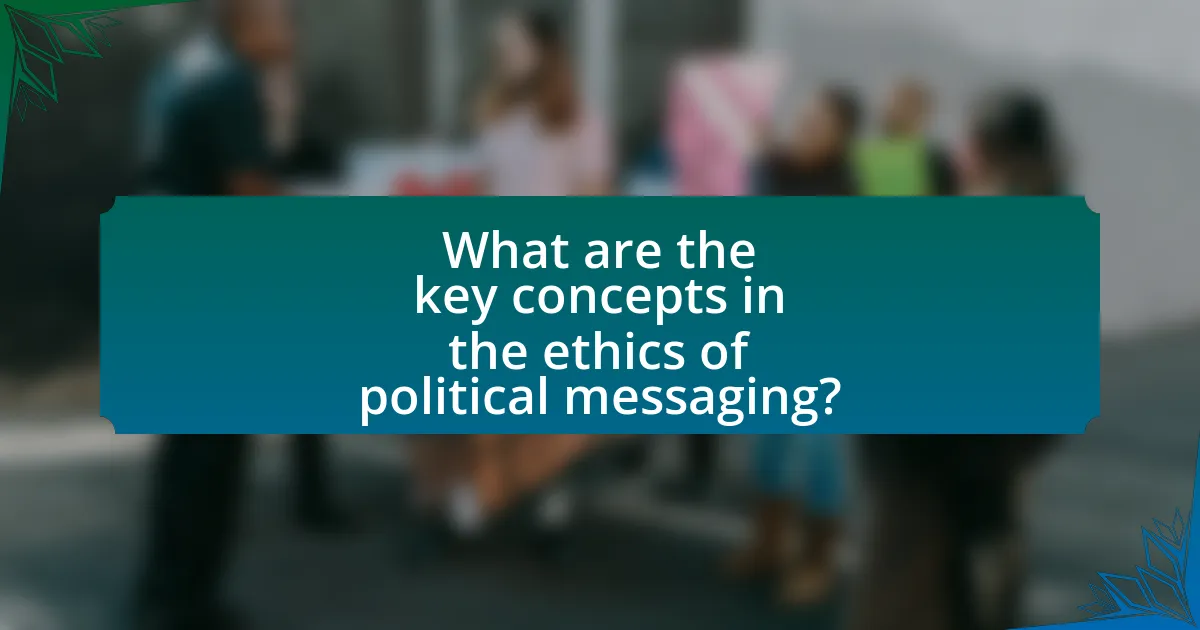
What are the key concepts in the ethics of political messaging?
The key concepts in the ethics of political messaging include truthfulness, transparency, manipulation, and the responsibility of communicators. Truthfulness refers to the obligation of political messages to convey accurate information, as misleading statements can distort public perception and undermine democratic processes. Transparency involves openly sharing the sources and intentions behind political messages, allowing the audience to critically evaluate the information presented. Manipulation is the unethical use of persuasive techniques to influence opinions or behaviors without the audience’s informed consent, which raises moral concerns about the integrity of political discourse. The responsibility of communicators emphasizes the ethical duty of politicians and their teams to consider the potential impact of their messaging on society, ensuring that their strategies do not exploit vulnerabilities or perpetuate misinformation. These concepts are essential for maintaining ethical standards in political communication and fostering a healthy democratic environment.
How do persuasion and manipulation differ in political messaging?
Persuasion and manipulation differ in political messaging primarily in their intent and ethical implications. Persuasion aims to influence an audience’s beliefs or actions through reasoned arguments and emotional appeals, fostering informed decision-making. In contrast, manipulation seeks to control or deceive an audience, often using misleading information or emotional exploitation to achieve a specific agenda without regard for the audience’s autonomy. For example, political campaigns that present factual data and encourage open dialogue exemplify persuasion, while those that spread false narratives to incite fear or anger illustrate manipulation. This distinction is crucial in evaluating the ethical boundaries of political communication.
What are the ethical implications of using persuasion in politics?
The ethical implications of using persuasion in politics include the potential for manipulation, the erosion of trust, and the impact on democratic processes. Persuasion can lead to the distortion of facts, where political actors may prioritize emotional appeals over factual accuracy, undermining informed decision-making among the electorate. For instance, studies have shown that misleading information can significantly influence public opinion and voter behavior, as seen in the 2016 U.S. presidential election, where misinformation spread through social media platforms affected voter perceptions. Additionally, excessive reliance on persuasive tactics can create a political environment where citizens become skeptical of all political messaging, ultimately damaging the foundational trust necessary for a functioning democracy.
How can manipulation undermine democratic processes?
Manipulation can undermine democratic processes by distorting the information that voters rely on to make informed decisions. When political messaging employs deceptive tactics, such as misinformation or emotional appeals, it can lead to a misinformed electorate. For instance, studies have shown that misinformation campaigns can significantly influence public opinion and voting behavior, as evidenced by the 2016 U.S. presidential election, where false information spread on social media affected voter perceptions and choices. This manipulation erodes trust in democratic institutions and processes, ultimately compromising the integrity of elections and the principle of informed consent that underpins democracy.
Why is ethical political messaging important for democracy?
Ethical political messaging is crucial for democracy because it fosters informed citizen participation and trust in the political process. When political messages adhere to ethical standards, they promote transparency and accountability, allowing voters to make decisions based on accurate information rather than manipulation or deception. Research indicates that ethical communication enhances civic engagement; for instance, a study by the Pew Research Center found that 70% of Americans believe that honesty in political messaging is essential for a functioning democracy. This trust is foundational, as it encourages active participation and reduces polarization, ultimately strengthening democratic institutions.
What role does trust play in political communication?
Trust is fundamental in political communication as it influences the effectiveness of messages and the credibility of political actors. When constituents trust their leaders and the information presented, they are more likely to engage with and support political initiatives. Research indicates that trust enhances the perceived legitimacy of political messages, leading to increased public compliance and participation in democratic processes. For instance, a study by the Pew Research Center found that 70% of Americans believe that trust in government is essential for effective governance, highlighting the critical link between trust and political engagement.
How can ethical messaging enhance voter engagement?
Ethical messaging enhances voter engagement by fostering trust and transparency between candidates and constituents. When political messages are grounded in honesty and integrity, they resonate more with voters, leading to increased participation in the electoral process. Research indicates that voters are more likely to engage when they perceive candidates as authentic and their messages as credible. For instance, a study by the Pew Research Center found that 70% of voters prioritize honesty in political communication, which directly correlates with their likelihood to vote. Thus, ethical messaging not only builds a positive relationship with the electorate but also motivates higher voter turnout.
What are the potential consequences of unethical political messaging?
Unethical political messaging can lead to significant consequences, including the erosion of public trust in political institutions. When politicians or parties engage in misleading or deceptive communication, it undermines the credibility of the political system, as evidenced by studies showing that misinformation can decrease voter turnout and increase polarization among the electorate. For instance, a 2020 study published in the journal “Political Communication” found that exposure to false information negatively impacted individuals’ perceptions of political candidates and their willingness to participate in elections. Additionally, unethical messaging can incite social unrest, as seen in various political contexts where inflammatory rhetoric has led to protests and violence. Overall, the ramifications of unethical political messaging extend beyond individual elections, affecting the broader democratic process and societal cohesion.
How can misinformation impact public opinion?
Misinformation can significantly distort public opinion by shaping beliefs and attitudes based on false or misleading information. For instance, studies have shown that exposure to misinformation can lead to the formation of incorrect beliefs, which can persist even after the misinformation is debunked. A notable example is the 2016 U.S. presidential election, where false claims about candidates circulated widely on social media, influencing voter perceptions and decisions. Research published in the journal “Science” by Vosoughi, Roy, and Aral in 2018 found that false news stories spread more rapidly on Twitter than true stories, highlighting the powerful effect misinformation can have on shaping public discourse and opinion.
What are the long-term effects of manipulation on political discourse?
The long-term effects of manipulation on political discourse include the erosion of trust in political institutions and the polarization of public opinion. Manipulative tactics, such as misinformation and emotional appeals, can lead to a disengaged electorate that is skeptical of genuine political communication. Research indicates that repeated exposure to manipulated messages can create a desensitization effect, where individuals become less discerning about the credibility of information sources. For example, a study by the Pew Research Center found that 64% of Americans believe that fabricated news stories cause confusion about basic facts, highlighting the detrimental impact of manipulation on informed discourse. Over time, this environment fosters division, as individuals gravitate towards echo chambers that reinforce their biases, ultimately undermining democratic processes and civic engagement.

What strategies can be employed for ethical political messaging?
Ethical political messaging can be achieved through transparency, factual accuracy, and respect for the audience’s intelligence. Transparency involves clearly disclosing the sources of information and the motivations behind the messaging, which builds trust with the audience. Factual accuracy ensures that all claims made are verifiable and based on reliable data, reducing the risk of misinformation. Respect for the audience’s intelligence means engaging them in a way that acknowledges their ability to think critically, avoiding manipulation tactics such as fearmongering or emotional exploitation. Research indicates that campaigns adhering to these principles not only enhance credibility but also foster a more informed electorate, as seen in studies by the Pew Research Center, which highlight the importance of trust in political communication.
How can politicians ensure their messaging is ethical?
Politicians can ensure their messaging is ethical by adhering to transparency, honesty, and accountability in their communication. Transparency involves clearly disclosing the sources of information and funding for campaigns, which builds trust with the electorate. Honesty requires politicians to present facts accurately and avoid misleading statements, as evidenced by the fact that misinformation can lead to public distrust and disengagement, as shown in studies by the Pew Research Center. Accountability means taking responsibility for the content shared and being open to scrutiny, which reinforces ethical standards in political discourse.
What guidelines should be followed to maintain ethical standards?
To maintain ethical standards in political messaging, communicators should adhere to transparency, honesty, and respect for the audience. Transparency involves clearly disclosing the sources of information and the intent behind the messaging, ensuring that audiences are not misled. Honesty requires presenting facts accurately without distortion or manipulation, which fosters trust and credibility. Respect for the audience entails acknowledging their intelligence and autonomy, avoiding deceptive tactics that exploit emotions or biases. Research indicates that ethical communication enhances public trust and engagement, as demonstrated in studies by the American Psychological Association, which highlight the importance of ethical standards in fostering healthy democratic discourse.
How can transparency be integrated into political messaging?
Transparency can be integrated into political messaging by ensuring that information is clear, accessible, and verifiable. This can be achieved through the use of plain language, providing sources for claims, and openly sharing data that supports policy positions. For instance, political campaigns that publish detailed reports on funding sources and expenditures demonstrate accountability, which fosters trust among constituents. Research indicates that voters are more likely to support candidates who prioritize transparency, as evidenced by a study from the Pew Research Center, which found that 70% of Americans believe that transparency in government is essential for democracy.
What role do fact-checking and accountability play in ethical messaging?
Fact-checking and accountability are essential components of ethical messaging, as they ensure the accuracy and reliability of information disseminated to the public. By verifying claims and holding communicators responsible for their statements, fact-checking promotes transparency and builds trust between the messenger and the audience. For instance, organizations like PolitiFact and FactCheck.org systematically evaluate political statements, providing evidence-based assessments that help the public discern truth from misinformation. This process not only discourages the spread of falsehoods but also encourages communicators to adhere to ethical standards, thereby fostering a more informed electorate.
How can fact-checking organizations support ethical political communication?
Fact-checking organizations support ethical political communication by verifying claims made by politicians and political entities, thereby promoting transparency and accountability. These organizations analyze statements against factual evidence, which helps to prevent the spread of misinformation that can manipulate public opinion. For instance, during the 2020 U.S. presidential election, organizations like PolitiFact and FactCheck.org played crucial roles in debunking false claims, which contributed to a more informed electorate. By providing accurate information, fact-checking organizations empower citizens to make decisions based on facts rather than misleading narratives, thus fostering a healthier democratic process.
What mechanisms can be established for accountability in political messaging?
Mechanisms for accountability in political messaging include regulatory frameworks, transparency requirements, and fact-checking initiatives. Regulatory frameworks, such as the Federal Election Commission in the United States, enforce rules on campaign advertising and disclosures, ensuring that political messages are truthful and not misleading. Transparency requirements mandate that political entities disclose funding sources and the origins of their messaging, which helps the public assess potential biases. Fact-checking initiatives, like those conducted by organizations such as PolitiFact and FactCheck.org, provide independent verification of claims made in political messaging, holding politicians accountable for misinformation. These mechanisms collectively enhance the integrity of political discourse and promote informed citizenry.
How can technology be leveraged for ethical political messaging?
Technology can be leveraged for ethical political messaging by utilizing data analytics and social media platforms to promote transparency and engage voters in informed discussions. Data analytics allows political campaigns to understand voter preferences and tailor messages that resonate with their values, ensuring that communication is relevant and respectful. Social media platforms can facilitate direct dialogue between candidates and constituents, fostering an environment where diverse opinions are shared and considered. For instance, the use of fact-checking tools and algorithms that prioritize credible sources can help combat misinformation, thereby enhancing the integrity of political discourse. Studies have shown that campaigns that prioritize ethical messaging and transparency can lead to increased voter trust and participation, as evidenced by the rise in voter engagement during elections that emphasized open communication and factual information.
What tools can help ensure accurate information dissemination?
Fact-checking tools, such as Snopes and FactCheck.org, can help ensure accurate information dissemination. These platforms verify claims and provide evidence-based assessments, which are crucial in combating misinformation. For instance, Snopes has debunked numerous viral myths, demonstrating its effectiveness in clarifying facts. Additionally, social media platforms like Twitter and Facebook have implemented features that flag potentially misleading content, further aiding users in identifying accurate information. These tools collectively contribute to a more informed public discourse, essential in the context of political messaging.
How can social media platforms promote ethical messaging practices?
Social media platforms can promote ethical messaging practices by implementing strict content moderation policies that prioritize transparency and accountability. These platforms can establish guidelines that require users to disclose the sources of their information, thereby reducing the spread of misinformation. For instance, Facebook has introduced fact-checking partnerships to verify the accuracy of shared content, which helps users make informed decisions. Additionally, platforms can utilize algorithms that prioritize credible sources over sensationalist content, as seen in Twitter’s efforts to label misleading tweets. By fostering an environment that values ethical communication, social media platforms can significantly mitigate the risks of manipulation and promote responsible political discourse.
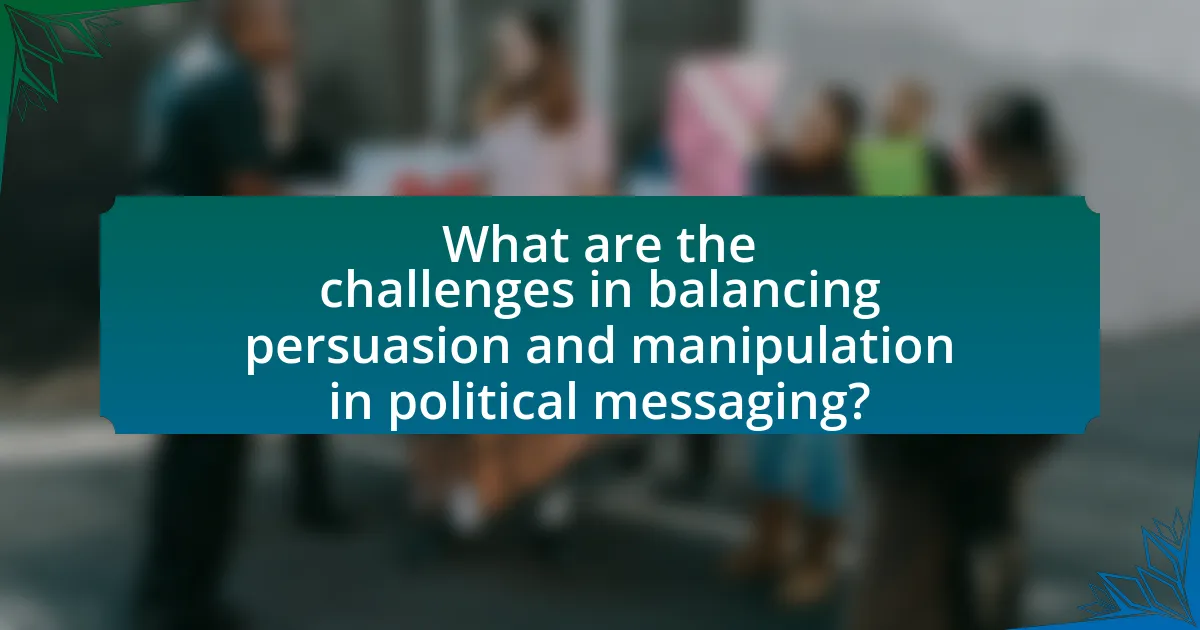
What are the challenges in balancing persuasion and manipulation in political messaging?
The challenges in balancing persuasion and manipulation in political messaging include maintaining ethical standards while effectively influencing public opinion. Political communicators often struggle to differentiate between legitimate persuasive techniques, which aim to inform and engage, and manipulative tactics that exploit emotions or misinformation to deceive. For instance, the use of fear-based messaging can sway voters but risks crossing ethical boundaries, as seen in various political campaigns where exaggerated threats were presented to elicit emotional responses. This creates a dilemma: while persuasive messaging can foster informed decision-making, manipulation undermines trust and can lead to voter apathy or backlash, complicating the overall effectiveness of political communication.
What obstacles do politicians face in maintaining ethical messaging?
Politicians face significant obstacles in maintaining ethical messaging, primarily due to the pressure to appeal to diverse voter bases while navigating complex political landscapes. This pressure often leads to the temptation to prioritize persuasive tactics over ethical considerations, resulting in misleading information or emotional manipulation. For instance, a study by the Pew Research Center found that 64% of Americans believe that politicians often mislead the public, highlighting the widespread perception of unethical messaging practices. Additionally, the rapid dissemination of information through social media complicates the ability to control narratives, as false information can spread quickly, forcing politicians to react rather than proactively communicate ethically.
How do public perceptions of political messaging influence ethical considerations?
Public perceptions of political messaging significantly influence ethical considerations by shaping the standards of acceptable communication and behavior in political discourse. When the public perceives political messaging as manipulative or misleading, it raises ethical concerns regarding transparency and honesty in communication. For instance, studies have shown that voters are more likely to reject candidates who employ deceptive tactics, thereby pressuring politicians to adhere to ethical norms that prioritize truthful representation. This dynamic illustrates how public scrutiny can enforce ethical accountability, compelling political actors to align their messaging strategies with societal expectations of integrity and respect for the electorate.
What external pressures can lead to unethical messaging practices?
External pressures that can lead to unethical messaging practices include competitive market dynamics, regulatory constraints, and public opinion shifts. Competitive market dynamics often push organizations to prioritize persuasive tactics over ethical considerations, resulting in misleading or manipulative messaging. Regulatory constraints, such as those imposed by advertising standards, can create a pressure to circumvent rules, leading to unethical practices. Additionally, shifts in public opinion can compel organizations to adopt sensationalized or deceptive messaging to align with prevailing sentiments, further compromising ethical standards. These factors collectively contribute to a landscape where unethical messaging practices may thrive.
How can political messaging adapt to changing societal norms?
Political messaging can adapt to changing societal norms by actively monitoring public sentiment and incorporating diverse perspectives into communication strategies. This adaptation involves utilizing data analytics to gauge shifts in values and priorities among different demographics, ensuring that messages resonate with contemporary issues such as social justice, climate change, and equality. For instance, research from the Pew Research Center indicates that younger voters prioritize climate action and social equity, prompting political campaigns to emphasize these themes in their messaging. By aligning their narratives with the evolving expectations of the electorate, political entities can maintain relevance and foster trust, ultimately enhancing their persuasive impact while avoiding manipulation.
What role does cultural context play in ethical political messaging?
Cultural context significantly influences ethical political messaging by shaping the values, beliefs, and norms that inform how messages are received and interpreted. For instance, political messages that resonate with a community’s cultural identity are more likely to be perceived as ethical and legitimate. Research indicates that messages aligned with cultural narratives can enhance trust and engagement among constituents, as seen in the 2008 U.S. presidential campaign, where Barack Obama effectively utilized cultural references to connect with diverse voter groups. This alignment fosters a sense of belonging and relevance, reinforcing the ethical responsibility of political communicators to consider cultural nuances in their messaging strategies.
How can political campaigns evolve to meet ethical standards?
Political campaigns can evolve to meet ethical standards by implementing transparency in their messaging and adhering to established ethical guidelines. Transparency involves clearly disclosing funding sources, affiliations, and the intent behind campaign messages, which can help build trust with voters. Adhering to ethical guidelines, such as those set forth by organizations like the American Association of Political Consultants, ensures that campaigns avoid deceptive practices and prioritize honesty in their communications. Research indicates that campaigns that prioritize ethical standards not only enhance their credibility but also foster a more informed electorate, ultimately contributing to a healthier democratic process.
What best practices can be adopted for ethical political messaging?
Ethical political messaging can be achieved by adhering to transparency, accuracy, and respect for the audience. Transparency involves clearly disclosing the source of information and the intent behind the message, which fosters trust. Accuracy requires that all claims made in political messaging are fact-checked and supported by credible evidence, as misinformation can lead to public harm and erosion of democratic processes. Respect for the audience entails avoiding manipulative tactics that exploit emotions or biases, instead promoting informed decision-making. Research indicates that ethical messaging not only enhances credibility but also encourages civic engagement, as seen in studies by the Pew Research Center, which highlight the positive correlation between transparency in messaging and public trust in political institutions.
How can political candidates effectively communicate their values ethically?
Political candidates can effectively communicate their values ethically by prioritizing transparency and authenticity in their messaging. This involves clearly articulating their beliefs and policy positions without exaggeration or misleading statements. For instance, candidates can share personal stories that illustrate their values, thereby creating a genuine connection with voters. Research indicates that voters respond positively to candidates who demonstrate honesty and integrity, as seen in studies by the Pew Research Center, which highlight that 70% of voters value transparency in political communication. By maintaining consistency between their words and actions, candidates reinforce their credibility and foster trust among constituents.
What are the key takeaways for ensuring ethical political messaging?
Key takeaways for ensuring ethical political messaging include transparency, accuracy, and respect for the audience. Transparency involves clearly disclosing the sources of information and the motivations behind the messaging, which builds trust with the audience. Accuracy requires that all claims made in political messaging are fact-checked and supported by credible evidence, as misinformation can lead to public harm and erode democratic processes. Respect for the audience entails acknowledging their intelligence and autonomy, avoiding manipulative tactics that exploit emotions or biases. These principles are essential for fostering a healthy political discourse and maintaining the integrity of democratic engagement.
